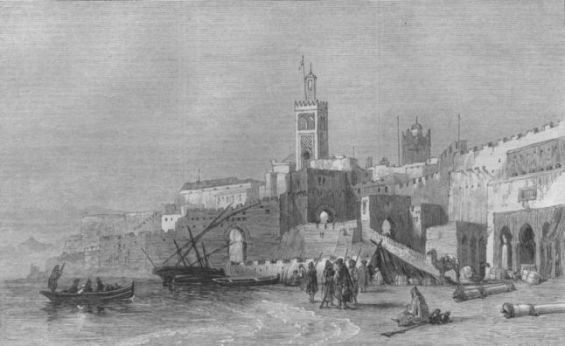In the 1860s, Morocco was at the heart of a diplomatic crisis that involved the United States, North American unrecognized state the Confederacy, France and Great Britain. As friend of the United States of America, Morocco arrested two diplomats from the «Confederate States of America», who visited Tangier in the winter of 1862.
The incident, which angered European powers and violated Morocco’s neutrality during the American Civil War, was orchestrated by the U.S. Consul James DeLong, who ordered the arrest of the two Confederate diplomats Henry Myers and Tom Tunstall.
The two men sailed in a ship from Cadiz, a port city in Southern Spain, to Tangier to visit an ill friend. They were taken by surprise when wandering in the Moroccan city and were held prisoners in the American Legation.

Myers was the paymaster of Raphael Semmes, an officer in the Confederate navy during the American Civil War. He was sent to Cadiz by Semmes to «secure a load of coal», William Marvel wrote in his book «The Alabama and the Kearsarge : The Sailor's Civil War» (Univ of North Carolina Press, Nov 9, 2000), while Thomas Tunstall was «an Alabamian who had spent five years as the U.S. Consul at that city until his resignation in 1861».
The two men decided to visit Morocco in a French vessel and after embarking in Tangier, Consul DeLong, who knew about their trip, went ahead with his plan.
The American Civil War and Morocco's neutrality
According to Marvel, «the Moroccan authorities performed the arrest». The two men, who ended up in «irons at a makeshift prison at the Consulate», were accused of «destroying the material interests of the United States, of which they were legal citizens», Jamie L. Jones wrote on the Tangier American Legation blog.
The President Lincoln's Cottage organization wrote that DeLong arrested Myers and Tunstall for insulting the American flag. «Flying over one of the buildings in Tangiers was an American flag and both Confederates paused to make loud, angry, disparaging remarks about it», recalled the organization.
The arrest of the two men angered European subjects in the city, reported Marvel, who wrote that a «volunteer lieutenant in charge of the U.S. store ship Ino (a ship that carries supplies) carried the prisoners to sea after braving a mob of outraged British subjects with his armed escort».

«Trussed in irons», Myers and Tunstall were taken to Boston where they got lodged in Fort Warren, a historic fort on the 28-acre Georges Island at the entrance to Boston Harbor.
Celebrating his short-lived victory, DeLong said after the arrest of two men that «American citizens may talk and plot treason at home, but they shall not do so where I am, if I have the power to prevent it».
Delong was at the heart of controversy after the incident. The French and the British felt betrayed by the U.S. and a diplomatic crisis was about to take place. Responding to critics, DeLong «defended his actions on the grounds that Morocco, the United States, and other ‘Christian’ powers had signed a treaty allowing foreign consuls jurisdiction over their own citizens», Marvel said. The historian added that DeLong’s deeds «circumvented Moroccan neutrality».
Fearing a diplomatic crisis with the French, Abraham Lincoln decided to release Tunstall and Myers from their Boston prison and «removed DeLong from his position».





 chargement...
chargement...













